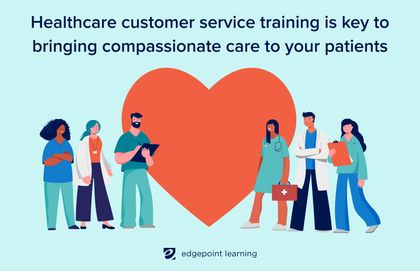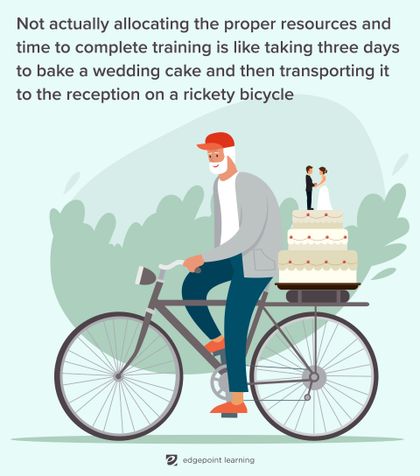How to Create Exceptional Healthcare Customer Service Training
Corey Bleich
🍿🍿 8 min. read
Whether you’re with a large hospital group or manage a bustling family practice, your patients today crave exceptional concierge-like care that starts with their very first interaction. Achieve that with a great healthcare customer service training program and you’ll get repeat patients and referrals lining up outside your door.
From the moment individuals hit your website or talk to your front desk staff, healthcare customer service training is key to bringing compassionate and skilled customer care to every person your providers and staff interact with to make your patients feel more at ease. (Don’t forget the family members or caretakers who also interact with your team!) This is how to create a healthcare customer service training program that you can easily roll out to your providers, staff, and everyone else who interacts with patients at your practice.
🔍 What you’ll find in this post
Why is customer service important in healthcare?
From urgent care centers to clinics at the back of drugstores, patients have more choice than ever in their healthcare providers. And today, after the intensity of the COVID-19 pandemic, many patients still remain battered and exhausted after their healthcare experiences. Patients are craving a comforting and concierge-like experience as they begin to rebook their annual exams, physical therapy appointments, mental health sessions, or dental appointments they’ve put off for too long.
Customer service in healthcare is loosely defined as any interaction between a company representative and the customer. This could be as remote as a chatbot and as close as a stethoscope between doctor and patient in an office visit.
Today, customers are looking for more than talented doctors (although that is still important). They want a positive experience from the moment of their first contact with your office. Even in something as simple as responding to a comment on your Facebook page, customers want to feel like you respect them and will treat them with care.

Beyond the clinic room, patients and their families want great customer service whether you and your staff are:
- Interacting with patients online (social media, website, etc.)
- Setting up appointments via phone, text, or email
- Following up with test results
- Answering questions about procedures (medical and office)
- Handling forms (insurance and compliance documents)
- Answering account and billing questions
Customer service training doesn't just benefit patients. Employees who feel capable and confident in their ability to respond to clients experience less frustration and are more inclined to stay in their jobs. Cycling through employees because they don’t feel supported can get expensive, fast.
Customer service in healthcare training capitalizes on employee strengths and offers them tools to remedy any areas of weakness. This makes both employees and the patients they serve feel valued and important.
What are key customer service skills in healthcare?
Excellent soft skills are crucial for healthcare professionals who interact with patients and their families. These healthcare customer service skills help build trust, increase patient satisfaction, and ultimately improve the overall patient experience at your practice.
These are the most essential healthcare customer service skills to train your team on:
- Empathy: Being able to understand and connect with patients on an emotional level is vital
- Active listening: Taking the time to actively listen to patients' and their families’ concerns and needs can help your team provide exceptional care
- Patience: Visiting the doctor or another provider can be stressful, and patients may need extra time and attention to feel comfortable
- Clear communication: Explaining complex medical concepts, insurance and payments information, and treatment options in simple terms can help patients understand their health and treatment plans
- Adaptability: Healthcare providers need to be flexible and adapt to patients' unique needs and circumstances
In addition to these core customer service skills, healthcare professionals should also prioritize being respectful, honest, and reliable. With excellent customer service skills, your team can help all patients feel more comfortable, informed, and empowered throughout their healthcare journey.
How to improve your healthcare customer service training
If you aren’t sure which customer service training ideas for healthcare to implement first (or even how to get started!), here are seven ideas to improve your healthcare customer service training:
- Conduct a training needs analysis
- Start thinking of patients as customers
- Put empathy at the forefront
- Watch how employees interact with patients
- Ask patients for feedback
- Allocate resources
- Roll out healthcare customer service training activities
- Protect patients, first
Let’s look at each of these in more detail.
1. Conduct a training needs analysis
Any healthcare customer service training should start with a training needs analysis. This establishes goals for your learning program and identifies where the gaps in skill levels and abilities lie.
Set goals and objectives for your training now, too. You can then identify which training tools you have available to start with, as well as what you’ll need to create or locate to meet your organizational goals.
2. Start thinking of patients as customers
This step is not too challenging, given the multiplicity of healthcare options these days. Maybe the head of your practice is highly skilled and decorated, but if the office staff is condescending or forgetful, all the skill in the world won’t keep patients there. Imagine each patient is a family member (that you like!). How would that change the way you treat them?
Alternately, keep in mind that patients can go pretty much anywhere they want for healthcare. Make them want to choose your team.
3. Put empathy at the forefront
If patients are visiting you, they’re often hurt, scared, confused, or worried (or all of the above!). Encouraging your team to develop and use this most important skill when interacting with patients is essential for improving patient satisfaction and building trust.
One way to promote empathy is by sharing real patient stories and experiences, which can help your team understand the perspective of their patients. Do this in video libraries of on-demand topics, within your training series itself to bolster key points, or in messages from your leadership team.
4. Watch how employees interact with patients
Many employees will struggle with this step, thinking of it as an evaluation of their work. And it is, to a certain extent! The major goal of the observation, though, is to establish how the office is doing in terms of customer service. Is the employee courteous, at a minimum? And going deeper, can they answer patient questions, or do they know what to do when they can’t? Does the patient leave the interaction looking satisfied and at-ease or reassured?
If the answer to any of these questions is “no,” this is valuable information you can use to design healthcare customer service training activities that make an immediate difference for employees and patients alike.
5. Ask patients for feedback
The good, the bad, and the ugly. No one wants a bad review posted, but giving patients the chance to air their grievances (or sing your praises) can give you valuable data in terms of organizational goal-setting for future healthcare customer service training. For example, if patients are struggling to make appointments because they are not getting timely responses, this might be a good place to start.
Offer patients surveys as they leave your office or give them a chance to respond via email. This is not soliciting a review but fact-finding for training purposes only. Once you do get feedback, always thank your patients for taking the time to give that feedback. Follow up with them to help them resolve any concerns immediately, and acknowledge that your team will use their insights to do better in the future. Consider also using your follow-up to ask for suggestions on how to get closer to that perfect “10” rating. Patients will feel less like they’re criticizing, and more like they’re collaborating in your efforts to do better.
6. Allocate resources and time
Don’t just design a learning course and expect your staff to slot it in on their own time and/or at their own expense. If it matters to you, reduce friction and motivate employees by giving them the proper amount of time, incentives, and resources (material and otherwise) for the training to be effective.
Not actually allocating the proper resources and time to your team to complete the training is like taking three days to bake a $500 wedding cake and then transporting it to the reception on a rickety bicycle. Someone is going to end up very unhappy.

7. Roll out healthcare customer service training activities
Customer service in healthcare training activities can be tailored to your organizational goals and objectives, but deliver the activities in the best format. For example, if your staff needs more experience dealing with upset patients, you might consider online role-playing to address customer concerns.
Healthcare customer service training activities aim to improve the skills of healthcare professionals who interact with patients and their families. Here are some examples of effective training activities:
- Online training: Online training modules can be a great way to teach the basics of customer service skills
- Role-playing exercises: This involves simulating real-life scenarios in which your team practices communication skills with patients
- Interactive workshops: Workshops can cover various topics, such as empathy, active listening, and effective communication
- Feedback sessions: Regular feedback sessions can help your team identify areas for improvement and reinforce positive behaviors
- Case studies: Case studies can be used to highlight successful patient interactions and provide examples of how to handle difficult situations
Regardless of the specific training activities used, it is essential to ensure that the training is relevant, engaging, and practical. Incorporating real-life scenarios, offering opportunities for practice and feedback, and tailoring the training to the unique needs of your organization can help ensure that the training is effective.
Discover more
Gamified modules that lead staff through branched challenges can mimic the real-life stresses of a scared patient standing in front of them.
8. Protect patients, first
Healthcare customer service training also has to include ways to protect patients from invasions to their privacy. For things like HIPAA compliance, eLearning is a great way to deliver information to your staff, including reminders about protecting patient information and any changes to regulations.
Cybersecurity training courses also address ways to protect patients, their personal health information (PHI), and the people who handle it. All of the customer service training ideas for healthcare won’t matter a whit if your entire roster of patients has their identities stolen and employees do not know the procedure for remedying the breach.
Get help from the experts in healthcare training
At EdgePoint Learning, we partner with many leading healthcare organizations to develop personalized employee training experiences for their teams.
From on-demand eLearning to online simulations to a curated learning experience, we can help you create training that resonates with your team and ultimately helps you offer the customer service your patients deserve. Get in touch today to learn more.

